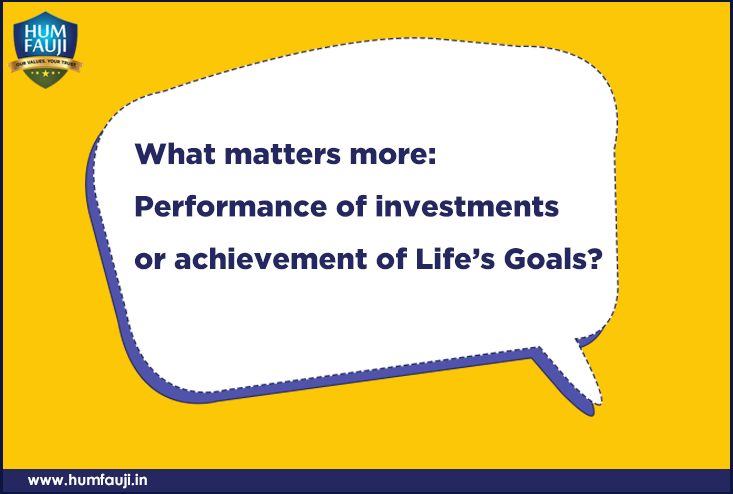Getting into the best performing stocks, commodities, Futures & Options or even FDs at the best rate of interest has been the dream of most of the people. Let’s say you get such an opportunity – you invest in a stock which turns out to be the best performing stock of the year and doubles your Rs 1 Lakh to Rs 2 Lakhs. What follows is the sense of satisfaction and déjà vu (even though it may be by fluke!); probably some part of the gains will go into an impulse purchase as an instant gratification reward and some will take care of an outstanding (perceived or actual!) long-standing need. But will this Rs 1 Lakh of profit be available to you just about six months later? Unlikely. Will you be able to repeat this feat year-after-year? Unlikely. Will it contribute to something very important and long-term in your life like your child’s education, your own home, a good standard of living after retirement? Again unlikely. So all that you have achieved is a bit of adrenaline flow and a momentary triumph! And how much time and energy went into this activity of spotting such an opportunity?
Suppose, instead of spending your time and energies in looking for the best stocks or deals by going through reams of newspapers and magazines, listening to financial news channels (who incidentally always tell you to buy something urgently NOW and almost never to sell except the universally acknowledged duds!) or taking advice from a know-all friend who claims to have made huge profits in stocks in the past, you were to do a very boring job of making a long-term financial plan for yourself?
Careful long-term financial planning may not be as exciting as the adrenaline-flowing hot stocks or be a party stopper, it may even be outright boring. It may involve you doing drudgeries like some mathematical calculations, crystal gazing and stuff like that, but it will definitely bear you fruits in the long-term. When your child’s graduation arrives, you will not be running around emptying your Provident Fund. When you decide that it is time to go in for your own home, you will not have to keep postponing the plans because you do not have the down-payment money or the capacity to pay the EMIs on the home loan. Ditto, when you want to change your car 8-10 years after its purchase. Similarly, when you are 75 years of age, you will not have to keep lowering your standard of living year-after-year just because your pension or the pension corpus is losing its running battle to run-away inflation. So, long-term financial planning can be boring but effective.
Such a Financial Planning would involve carefully jotting down the major upcoming expenses of your life (called the Financial Goals, which should generally not number more than 10-12) for the next 20-30-40-50 years, doing the same for your anticipated money inflows from salary, rents, interest income and others, trying to roughly match the two, and then deciding on what should you invest in to achieve the goals. While deciding on investments, the general rule is that debt instruments are for the short term or for building up the safe part of your investments, while equity-linked investments are for building up long-term wealth. Real-estate, properly chosen and timed, is also an important part of portfolio but requires bulk investment which can be built up through long-term equity portfolio along with carefully orchestrated home loans. Never should tax-saving be the aim of investments – at best it should be incidental to investing. The financial plan thus made should be reviewed every 2-3 years to do mid-course corrections necessitated by your changes in priorities, circumstances, money inflows/outflows and market conditions.
Finally, can you do all this yourself? Actually you can and it is not all that tough. The tough part, however, is the yearly reviews of your financial plans, a review of your investments every 2-3 months and then realigning your investments as the markets and goals change, only because it involves a bit of discipline, acquiring some financial knowledge and sticking to it as if your life depended on it. However, all this is still far easier than the sense of despair you feel when you have a financial requirement really dear to you staring in the face and you cannot meet it…
And if you feel it is too much for you to handle, find a trusted financial planner who will do it all for you for a small fee.
Just as an aside, consider this: HDFC Life in association with Value Notes carried out a survey in India to find out how truly free an individual is from a financial perspective in terms of their financial awareness, planning, sufficiency, and adequacy of planning. Some of the top findings of the survey were:
- The Life Freedom Index at 58.3 on a scale of 0-100 shows that Indian consumers’ sense of financial freedom is low and is yet to reach a state of financial nirvana.
- Only 30-36% consumers take into account inflation during financial planning.
- While 35% of urban Indian consumers rely on their social network of friends and relatives for financial planning advice, only 27% seek professional help from Financial Planners / Advisors.
- Children’s education (75%) is the primary concern during financial planning for all Indian consumers, followed by health expenses (61%) and retirement (57%).
- Indian urban consumers residing in Tier 2 cities mirror a higher sense of financial freedom than their Tier 1 city counterparts.
- While the Urban Indian Woman is becoming financially independent, she is not yet completely financially free.
—
With regards,
Col (retd) Sanjeev Govila, CERTIFIED FINANCIAL PLANNERCM
CEO, Hum Fauji InitiativesTM,
Your Long-term Partner for Wealth Creation
E-511, 2nd Floor, Ramphal Chowk, Palam Extn, Sector 7, Dwarka, New Delhi-110077 | Tele: 9999 022 033, 011 – 4054 5977, 011 – 4214 7236 |
Subscribe to our blog for regular financial updates or follow us on | Facebook | Twitter | Linkedin














Leave a Reply